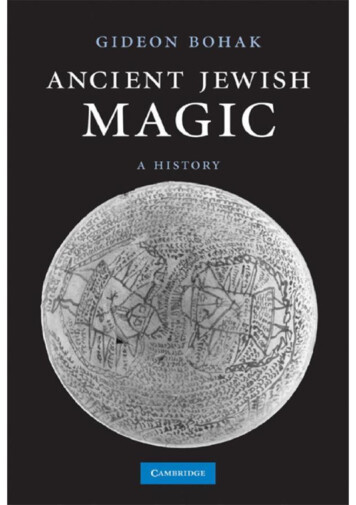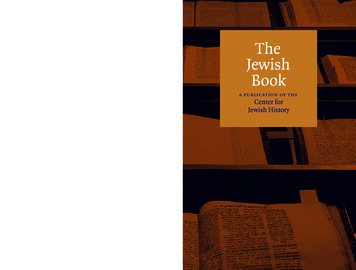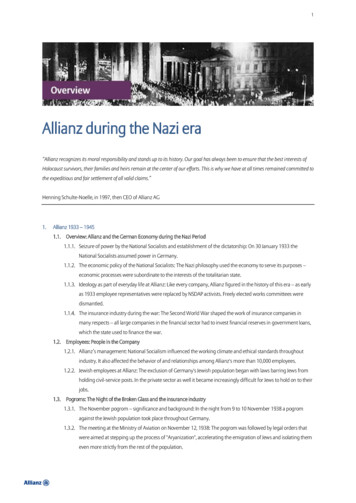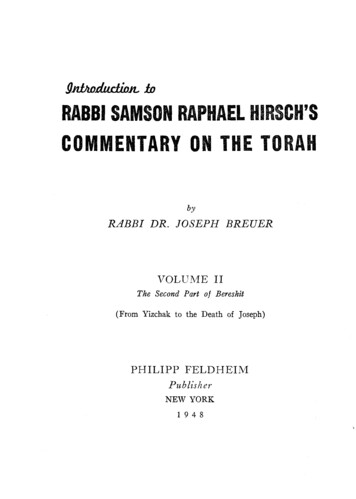
Transcription
RABBI NORMAN LAMMTHE JEWISH CENTERMay 27, 1972Naso"SAMSON"The Pathetic HeroThe Haftorah of this morning affords us an opportunity toreturn and re-investigate the figure of one of the mostfascinating Biblical personalities, Samson. I am intriguedby the paradox he poses: the vulnerability of an apparentlyinvincible hero, the weakness of a man so strong, the moralfrailty of a Nazir — one dedicated to abstemiousness andsaintliness, and all that this has to say to us about thecharacter and pretentions of both men and nations*The Rabbis of the Talmud, the tradition of the Midrash,and Bible commentators from ancient times to contemporary, areall of two minds about Samson* Some are sympathetic, despitehis failings. Others are antagonistic despite his virtues*An example of the favorable attitude to Samson is astatement by the Talmud (SotahlOa) thatSamsonhe waswe areBible,ruled over Israel even as their Father in Heavendoes —an eminently just man* Or, in the same Talmudic passage,told that in addition to his last words recorded in theSamson offered up a prayer before the Holy One, and said:(cff\i Ij"Remember unto me, 0 Lord, the twenty-two years that I ruledover Israel, and not once during this time did I say to asingle one of my people: Tmove this cane for me from one placeto another. He was considerate, compassionate, and neveroverbearing. He was, after all, one of the galaxy of * C t L(Judges), the great leaders of Israel, duing the formativeperiod of our people's history.However, there is also a tradition that is quite criticalof Samson. The hostility to him focuses largely on his lack ofmoral restraint. Thus, the Midrash tells us thatP %\V) \i ,\3y( tsiji* p jrl/M. , Samson couldusually be-found) amongst the- women.' The several chapters ofthe Bible that speak of him tell us of three entanglements withPhilistine women. Ralbag maintains that it was foreordainedthat Samson be a Nazirite so that at least there be some restrainton the powerful passions that raged in his breast. But thisrestraint failed. The seductiveness of Delilah prove morepowerful than the prohibitions ofhis Nazirite vows. The Rabbisinterpreted the name of Delilah as meaning
-2-engh diminishedd i i h d his heart,she dildelah — attenuated his strength,corrupted his conduct, so that the divine Presence leftSamson*As for myself, my own views have changed over the years,and I suppose they shall continue to do so. As of now, Iwould say that I am inclined more to the latter or lessfavorable view of Samson, although not without a good deal ofsympathy.Samson died a heroic death, but his life was not reallyheroic at all* It was, rather, what one might call aScriptural tragedy, one that begins even before his birth withvisions, with U, with devotion — and ends with anillicit love affair and moral bankrupcy. Like his fatherManoah, Samson was dominated by a woman* But what adifference there was! Whereas Manoah was helped by his wife,for without her perceptiveness and wisdom and strength hisname would never have been entered into the chronicles ofBiblical history, Samson was destroyed by Delilah, the womanwho dominated him* The figure of Samson emerges from thepages of the Bible as more pathetic than sympathetic.His hair, which he did not cut because of his Naziritestatus, is to me an important symbol of his personal charisma*I can imagine the effect of his appearance when he pouncedupon the PhUlistines, and even as he moved among his fellowIsraelites. Here was this giant, with his great muscles,and his flowing mane of wild hair* How awesome, how leonine,how overwhelming must have been the impression of this man of?O\P - (power)* Yet, like hair, this charisma wasattached to Samson but not really part of his intrinsic being*It was an aspect of his personality, perhaps, but it neverbecame an element of his character, his soul*With, all this charisma, Samson failed to become a trueleader* He was a Danite who operated by himself. Unlike otherjudges, he was not even the leader of his own tribe. Andcertainly unlike such people as Samuel and David, he never evenaspired to unify all the tribes into one nation. The Rabbis,perhaps somewhat whmsically. said that Samson was a loner —like God himself! Thus,G Y )ftt3 -* \O V * %, 9 !"Samson was like the cruly One of trie world**-God ; even as theOne needs or seeks no help from others but does all by Himself,
-3so Samson the son of Manoah."Samson was a man of power and charisma* While he usedthem for the service of his people, they never contributed tohis own growth. He had a long list of achievement of savingJews; he was ai 'C(/t * B u t n e hardly qualifies as a wiseman. The gestalt of Samson as he emerges from the pages ofthe Bible is not that of a truly religious personality or a manof Torah.Samson trivializes his \ (power) for petty affairs,for shallow love and illicit romance. He allowed Delilah toabuse his special qualities — his hair, his- H ' i J , hispower, his charisma — and so he lost it. Samson remained, atthe end of his life, exposed: all the world was there to seethat his unique qualities were not really part of him, theywere external to him. Just as the scissors snipped off hiscrown of Nazirite hair, so was the cunning of a woman enough toreduce his power and diminish his charm to nought.The Israeli writer and poet Abraham Kariv may be overstatingthe case, but certainly he has a point when he maintains thatSamson gave?VM'? * (strength) a bad name. His life, Karivmaintains, was a kind of divine experiment in joining ,V) and7 } p » strength and holiness. But somehow thesynthesis was net successful. Samson contained elements of both,but the gears did not mesh, the combination was never completed.And therefore V 1* }- never became a distinctive Jewishvirtue. Yes, Jews may have {)\P » and sometimes they mustpossess power and utilize it — it is through the exerciseof power that we have a State of Israel today. But it neverbecame part of the catalogue of great Jewish characteristicssuch that you would hold them forth as a model for futuregenerations. Perhaps we can put it this way: Samson remainsa Biblical Moshe Dayan.An appropriate metaphor for Samson!s type of charisma canbe taken from one of his most famous riddles. The Bible tellsus that he ripped apart a lion with his bare hands, and in thecarcass of the lion honeybees gathered and Samson ate thehoney they produced. Thereupon a riddle occurred to him and hetried it out as a bet upon his Philistine friends. The riddlewasIM-AH \ 3 » l {f* "from the strong there came forth thesweet.ff By this he meant that from the lion there came forthhoney.Samson indeed had both: the power and strength of a lion,and the personality and attractiveness that might be associatedwith sweetness. And his charisma came from his strength. Butthere is a curious tinniness to his life. He never becomes real.What is wrong is that the lion is -- dead. The sweetness
-4is lifeless* Even SamsonYs sense of humor leaves me cold.His is a charm that issues from the strength of illusion,from fundamental emptiness. Samson remains a man more to bepitied than admired or condemned.Added to all this, he was a proud and vain man. Thegreat historian of the Second Commonwealth, Josephus, in hisAntiquities of the Jews, reminds us that Samson boasted thathe smote a thousand men with a jawbone of an ass. At themoment of his triumph he did not attribute his success toGod. Only later when he was vexed and thirsty and dejected didhe appeal to God. But at the moment of his greatness he spokeonly of his own victories.But wherefrom this arrogance, so uncharacteristic of otherJudges and other Jewish leaders?The answer, I submit, is somewhat in the spirit of theYiddish expressionV * i 'K o '9 \' ft k — the brideis so beautiful that iV becomes a defect. I Samson1s problemwas that he was too successful. Everything went his way. Hislife was an unbroken string of triumphs and he received theadulation of his grateful but not too perceptive people. Andall this made him think that he is invincible.His egocentricity was not of the repulsive, adult kind.Unlike a Goliath who boasts when he confronts David, you cannotfeel antagonistic and angry with him. Samsonfs vanity ischildish and childlike. He strikes you as one who experiencedarrested development: his infantile myth of omnipotence alwaysremained with him. Since Samson never experienced defeat, hesimply grew up with that same feeling of superiority. And itwas this that brought about his downfall As an aside, read this psychological process on a largerscale, and you understand part of the problem of the UnitedStates in Vietnam. Leader after leader of this country has beenafraid to pull us out and "call it quits," because he did notwant to be the first President to preside over an Americandefeat. Our difficulty is that we are a country who for 200years never lost a war — and therefore we are bleeding ourselvesand a little country to death in the present involvement inVietnam. Some time ago a distinguished Senator, Mr. Aiken ofVermont, suggested to the Senate that the United States proclaimthat it won the war, so that now we can all pull out and go homeand have peace. What he was doing was indulging this childishquality in the American psychology -- since we never lost, wedare not lose for the first time. It is Samson!s problem onan international scale.
-5Compare Samson with two other Biblical heroes and see howthe point comes out more clearly. Joseph was also charming,attractive, and politically powerful. But at the climax ofhis life, at the great test, he did not rule over his brothersor tell them how important he is. Instead, he saidpJ »Ui J f\yl * M J » , it is not my doing but God*sdoing, where" did he get this sensible attitude, despite hissuccess? From the years that he sat in prison. His failuresmade him a success. He had enough insecurity to temper himinto realism. Whereas Samson never had the good fortune tofail.Similarly, compare Samson with David. David, facingGoliath, speaks not of himself and his own power, but rather ofthe God of Israel. He was wise enough to do so because he wasthe youngest and least prominent in the family. He was overlooked and, fortunately, studiously ignored.David suffered exile, hunger, and misery. And so, whenat the height of his career he commits the moral blunder withBathsheba and is reproached by the Prophet Nathan, he has thecourage and the moral strength to repent, to do *f / .Contrast this with Samson, from whom we hear not a single wordof regret or sorrow or contrition or apology. Samson was notable to do so because never before in his life did he have tosay, n I am sorry." (Perhaps our current generation, raised ona certain kind of novel and movie, might explain this by sayingthat Samson was in love with himself, and "being in love meansnever having to say Ifm sorry".) And so, when Samson wasconfronted by the great crises of his life, he crumbled morallyas well as physically. At his moment of truth, he was foundwanting. And at the end of his days, he lost his vision muchbefore he lost his sight as the Philistines plucked out his eyes.It is for this reason that I find his end dramatic —when he pulls down the whole palace killing the Philistines withhimself and crying out P s tO f \ 4r* ) \M-0 , "let me diewith the Philestines" mm but not quite as inspiring as I used tofind it in the past. There were times when I returned to thestory that I read this passage with great admiration. I stillfind it dramatic, but no longer admirable. Yes, Samson killed hisenemies, bringing his world crashing down around him, and perhapshe had no choice and it was better that he did it. But now Irealize something else: he left his own people a defeated people,all because of his vanity and his weakness.So I feel sorry for Samson, but I can neither respect him
-6nor truly like him.one.He is a hero, but a pathetic and pitifulThere are Biblical and Talmudical figures whom I recognizein contemporary life. With all necessary changes being made,I can respond to the contours of th e personality of an Aaronor a Solomon or a David or a Rabbi Akiva reincarnated, as itwere, in some living figure. A Samson, however, is a nonrepetitive character. I have never quite met a replica ofSamson the son of Manoah, but there are aspects of hispersonality that I recognize all about me — and even jin me.It is for this reason that this story is so very important.We must all search out within ourselves these particularqualities and reactions. This holds true especially for thosewho are more endowed with talent and potentiality; such peopleshould be doubly alert to his particular problem. And most ofall, those of us who are parents, whom God has given theresponsibility for a future generation and who normally feelinclined to indulge our children and spare them from pain, weought to look back at the personality and history of Samson andlearn our lesson.The Rabbis told us (Sotah 10a) that Samson was one of fiveBiblical figures created" ftrt R U * f 1 I* \ A , with adivine, superhuman talent. SamsonTs was his r o' , his )") f his strength. But he abused it. At a critical moment in hislife, his power and his charisma failed him. Better yet, hefailed them. He won all the battles, but he lost the war. So,in the Samson story, the Bible is not merely recording history.It is teaching us something -- about ourselves.
Samson was a man of power and charisma* While he used them for the service of his people, they never contributed to his own growth. He had a long list of achievement of saving Jews; he was a i 'C(/t * But ne hardly qualifies as a wise man. The gestalt of Samson as he emerges from the pages of the Bible is not that of a truly religious .










